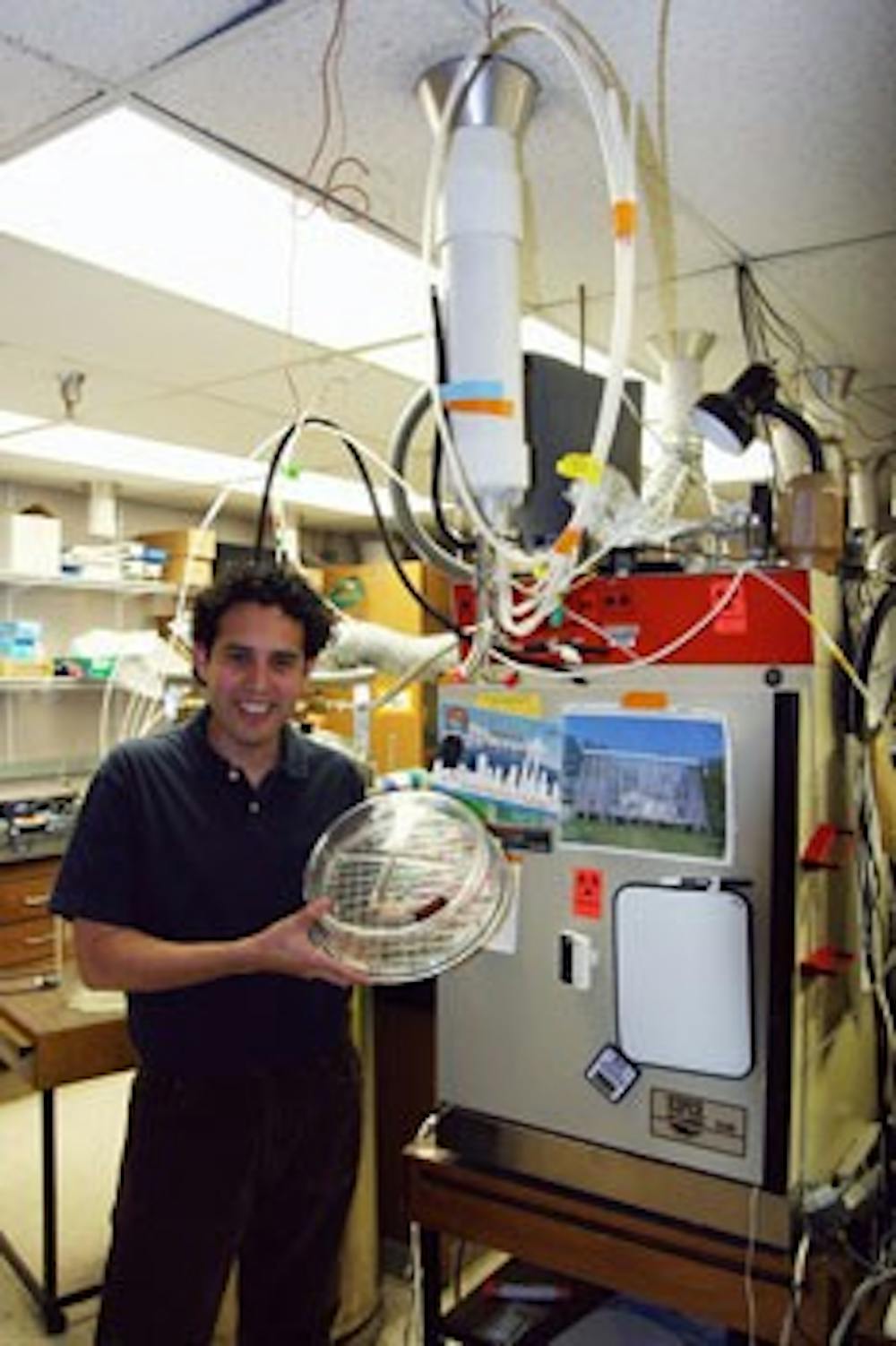William Vizuete isn't satisfied with working in a lab. He wants to see his research benefit the world.
Vizuete a researcher and professor in the Gillings School of Global Public Health is working toward reducing the effects of air pollutants on human health.
He hopes to identify the chemical reactions causing toxicity in the air" but his ultimate goal is to develop effective policy to control and reduce the sources of pollutants.
""I don't like science and chemistry for its own sake — only if I can use science to do something I feel good about" improving public health" Vizuete said.
Vizuete knows naturally occurring chemical reactions are making air pollutants more dangerous than they would normally be.
So far, his research points toward sunlight as the factor that enables this reaction.
Vizuete and fellow researcher Harvey Jeffries have been using the UNC outdoor smog chamber — an air research laboratory on the roof of McGavran-Greenberg Hall — to measure the effects of air pollutants on human lung cells.
The smog chamber is the only model of its kind in the U.S., and was developed at UNC about 40 years ago.
Vizuete and Jeffries discovered diesel engine emissions that had been aged in sunlight became up to 10 times more harmful than the original emissions.
But Vizuete said it's an open question how the more harmful products affect human health overall.
Our hypothesis is that it's not just the pollutant that's causing the deaths — it's the atmospheric chemical products"" he said. So we're now trying to isolate the magic species causing that increase in toxicity.""
In addition to finding this reactant" he is also trying to create a more usable tool to measure air quality.
Vizuete uses a device called a biosensor to measure the effects that pollutants have on people's lung cells.
Now he wants to develop a portable tool similar to the biosensor to measure air quality and toxicity.
Having this mechanism would allow him to measure air quality in cities and its effects on people.
And when the element causing the chemical reaction is determined" this new biosensor can be used to help the public.
""The idea is to identify" and then I can build and incorporate that chemistry going on into an air quality model" Vizuete said.
Then we can predict and make effective targeted control strategies that will affect the everyday person who breathes in these pollutants.""
The smog project has also drawn attention from the Environmental Protection Agency"" which has chosen to collaborate with Vizuete. The EPA will soon provide mice to test the cardiovascular effects of emissions aged in the smog chamber.
Results of Vizuete's past research projects have been used to provide policymakers with advice.
The results of his dissertation involving atmospheric chemistry and regional ozone formation were incorporated into a plan to improve Texas air quality to meet federal ozone standards in Houston.
""What excites me most about my research is that I am doing something that makes a real impact on society" he said. I've seen the results of research be incorporated" and that's the most satisfying.""
Vizuete is also involved with air quality research in the United Arab Emirates.
In lieu of its own facilities and researchers" the United Arab Emirates has signed a contract with researchers from the school of public health to assess the impact of its poor air quality on its citizens' health.
Vizuete works with an outdoor air quality team in this project. They are exploring pollutant sources and transportation in the country and hope to apply their findings to decrease exposure and create a public health plan.
Vizuete's research at UNC is funded by the Gillings Innovation Labs and is being conducted through collaboration between the school of public health and the UNC School of Medicine.
The funding is $300000 for two years which began July 1 2008 and is slated to end on July 1 2010.
Besides his research Vizuete also has a passion for jazz.
Vizuete has been a radio disc jockey since 1995" and currently hosts ""Jazz Incognito"" for WCOM 103.5 in Carrboro.
He cites jazz as an inspiration for his work in the lab.
""I'm always striving to give examples of improvisation in music and show an appreciation for the experimental"" he said.
I'm interested in innovation in jazz and science. Attacking a problem in a new way adds something unique that moves the field in a whole new direction. That reflects my need and desire to move the community ahead.""
Contact the University Editor at udesk@unc.edu.
A breath of fresh air

William Vizuete" assistant professor of environmental sciences and engineering at the UNC Gillings School of Public Health works in his lab. Vizuete is leading a Gillings Innovation Lab that uses cultures of human lung tissue cells to examine the effects of air pollutants on health.


